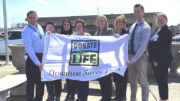FORT LAUDERDALE, Fla. (AP) — People boarded up beach homes, schools closed and officials ordered large-scale evacuations along the East Coast on Wednesday as Hurricane Matthew tore through the Bahamas and took aim at Florida, where the governor warned the state could be facing its “biggest evacuation ever.”
Gov. Rick Scott said he didn’t know how many people would be ordered to leave the coastline because it is left up to individual counties. So far, only Brevard and Martin counties have issued mandatory evacuation orders.
“When you look at this storm as it goes along the East Coast, we’re going to have to prepare every county, so it could be the biggest evacuation ever. Every county is focused on it though. We’ve been working on it even before today,” Scott said.
Matthew was a dangerous and life-threatening Category 3 storm with sustained winds of 120 mph, and it was expected to be very near Florida’s Atlantic coast by Thursday evening. It could become the first major hurricane to blow ashore in the U.S. since Wilma slashed across Florida in 2005.
At least 11 deaths in the Caribbean have been blamed on the storm.
In South Carolina, traffic was bumper-to-bumper as people fled on Interstate 26, the main artery out of Charleston. Gasoline was hard to come by, with at least half a dozen stations along the coast out of fuel and long lines at others.
“We’re staying because we have to board the house up,” Buff Schwab said as she wheeled in a cooler filled with food she purchased the night before at a local supermarket.
Storm shutters were closed on a number of palatial homes overlooking Charleston’s Civil War-era Battery along the water. Carriage tours made their way down streets that were largely empty of traffic.
In Florida, theme parks such as Walt Disney World watched the storm closely and Sea World told customers to anticipate altered hours.
“If you’re able to go early, leave now,” Scott said.
The National Hurricane Center in Miami said Matthew — at one point a fierce Category 5 — will remain a powerful storm at least through Thursday night as it nears Florida. The Hurricane Center said fluctuation in intensity was expected as the storm crawls up the East Coast.
Forecasters said there was a danger of life-threatening storm surge inundation along Florida’s east coast, much of which was under a hurricane watch or warning.
“When a hurricane is forecast to take a track roughly parallel to a coastline, as Matthew is forecast to do from Florida through South Carolina, it becomes very difficult to specify impacts at any one location,” said senior hurricane specialist Lixion Avila.
President Barack Obama was briefed on the federal government’s preparation at the Federal Emergency Management Agency’s headquarters in Washington.
“If you get an evacuation order, just remember that you can always rebuild, you can always repair property, we cannot restore a life if it is lost,” Obama said.
FEMA deployed personnel to Florida, Georgia, South Carolina and North Carolina. It’s also positioning commodities and other supplies at Fort Bragg in North Carolina and in Albany, Georgia.
On the Georgia coast, 92-year-old Lou Arcangeli saw two of his adult children come to his home on Tybee Island to help prepare and evacuate if necessary.
“It’s serious,” said Arcangeli, who has lived in the Savannah area since 1979, when Hurricane David became the last hurricane to make landfall on Georgia’s 100-mile coast. “I’m going to keep an eye on it and not wait until the last minute. As far as I’m concerned, what’s going to happen is going to happen.”
His son, also named Lou, arrived with sheets of plywood strapped to the top of his van with concrete blocks, folded tarps and a chainsaw in the back. He was also pulling a trailer with cans filled with gasoline. Daughter Anni Sisson was gathering her father’s photo albums, insurance papers and other documents to take with them if they decided to leave town.
South Carolina Gov. Nikki Haley announced plans starting Wednesday afternoon to evacuate a quarter million people — not including tourists — from the coast.
Haley said 315 buses were dispatched to two major coastal counties to help with evacuations. The National Guard and other law enforcement agents are mobilized, ready to ensure an orderly evacuation.
“We ask everybody to please be safe,” Haley said, warning those thinking of staying put that they could be risking the life of a law enforcement officer if they had to be rescued later.
Government officials are worried about complacency, especially in South Florida, which hasn’t seen a major hurricane — a Category 3 or higher — in 11 years.
Hurricane Hermine hit the eastern Panhandle on Sept. 2 as a Category 1 storm, causing one death, storm surge damage to beachfront homes and downed trees and powerlines. That was the first hurricane to strike Florida since Wilma — a Category 3 — slammed into the coast in 2005. The 11-year lull between Hermine and Wilma was the longest on record for Florida.
Governors in Florida, Georgia, South Carolina and North Carolina declared states of emergency.
In rural Turbeville, South Carolina, farmer Jeremy Cannon said he waited too long last year and watched his soybeans and cotton crops slowly drown as 20 inches of rain fell on his fields. This year he is taking no chances with Hurricane Matthew and will harvest about a week early.
This is the third year in a row weather is threatening the livelihood of this 35-year-old fourth generation farmer. Drought hurt him badly in 2014, and the massive flood last year set him back $800,000, which he didn’t come close to covering through insurance and some aid from the state.
“The Lord says pray without ceasing. And that’s what I’ve been doing — in the fields, near the barn — just praying all the time. I don’t want to find out what I’ll have to do if I get wiped out for another year,” Cannon said.







































